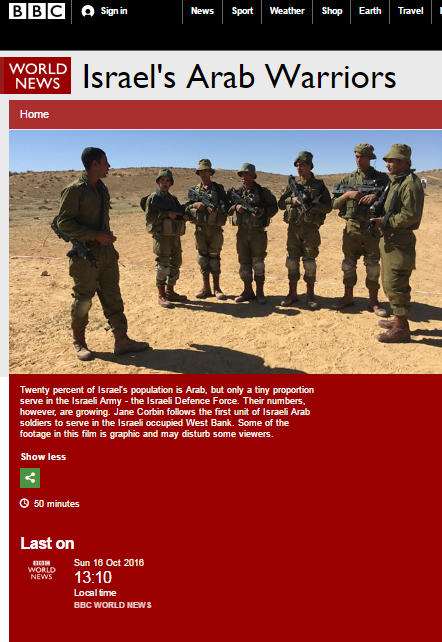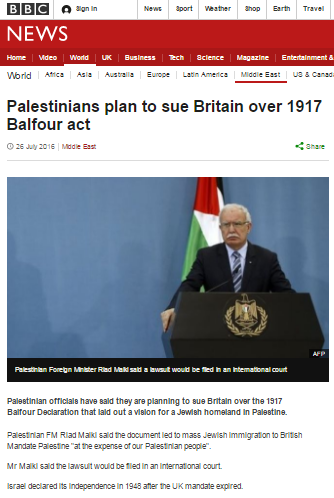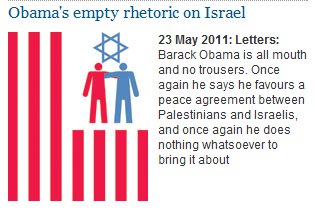In stark contrast to its remarkably generous – and one-sided – coverage of the Balfour Declaration centenary earlier this month, the BBC did not produce any content whatsoever concerning the November 29th seventieth anniversary of UN General Assembly Resolution 181 – known as the Partition Plan – which called for the creation of a Jewish state alongside an Arab state.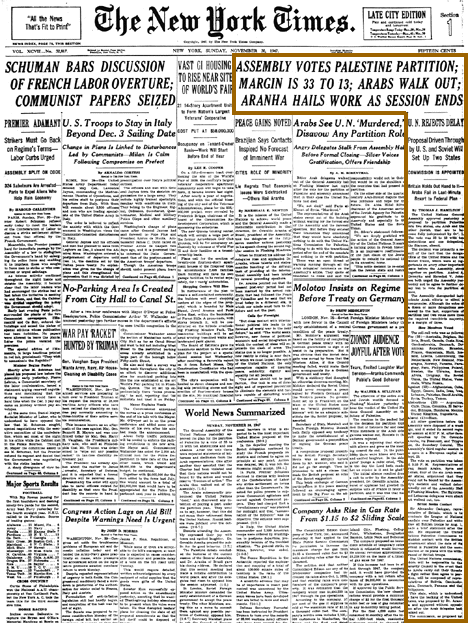
Readers may recall that the BBC has had difficulty presenting that topic accurately to its audiences in the past.
Omissions, distortions and inaccurate history in BBC WW1 ‘educational’ feature
BBC claims Ben Gurion “opposed” the Partition Plan
The BBC and the 1947 Partition Plan
Reviewing BBC portrayal of the 1947 Partition Plan
BBC’s Hugh Sykes tells R4 listeners that Jews rejected the Partition Plan
BBC Watch complaint on Partition Plan inaccuracy upheld
Moreover, the BBC has for years based its ongoing refusal to acknowledge Jerusalem as the capital city of Israel on an inaccurate understanding of UN GA resolution 181.
“The [BBC Trust’s Editorial Standards] Committee noted that while there is no expectation that in a two-state solution West Jerusalem would become Palestinian territory, a UN resolution passed in 1947 has not been rescinded. It calls for the whole of Jerusalem to be an international city, a corpus separatum (similar to the Vatican City), and in that context, technically, West Jerusalem is not Israeli sovereign territory. “ [emphasis added]
Yes, you read that correctly: the highest BBC body charged with ensuring the corporation’s adherence to editorial standards (including those of accuracy and impartiality) claims that the 1947 UN Partition Plan – aka UN GA resolution 181– has some sort of relevance or validity and based upon that gross misinterpretation, presumes to dictate that a city in which there has been a Jewish majority since the nineteenth century “is not Israeli sovereign territory”.
Despite what the members of the BBC Trust’s ESC may choose to believe, like most UN General Assembly resolutions, 181 was non-binding and in fact it was no more than a recommendation – the implementation of which depended upon the agreement of the parties concerned. As is well known (although apparently not in the higher corridors of the BBC) the Arab nations rejected the Partition Plan en masse and even threatened to use force to oppose it. The recommendation hence became a non-starter and its various clauses – including the corpus separatum proposal – irrelevant.”
While the BBC consistently and frequently tells its audiences that the two-state solution to the Arab-Israeli conflict is jeopardised by the existence of certain neighbourhoods in Jerusalem and Israeli towns and villages in Judea & Samaria, the fact that just such a solution was unilaterally rejected by the Arabs seventy years ago – long before most of the communities the BBC terms ‘settlements’ existed – obviously does not fit in with the corporation’s chosen narrative.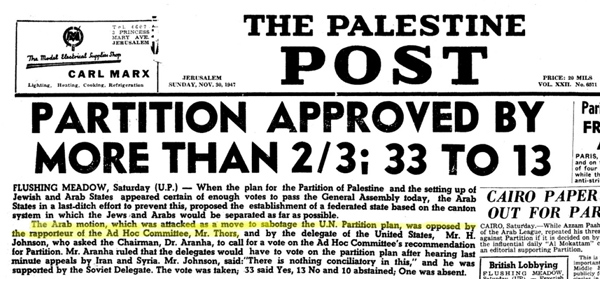
It therefore does not come as much of a surprise to see that while earlier this year the BBC devoted extensive coverage to the 50th anniversary of the Six Day War and more recently to the 100th anniversary of the Balfour Declaration, the 70th anniversary of the Partition Plan has gone completely unmarked.

